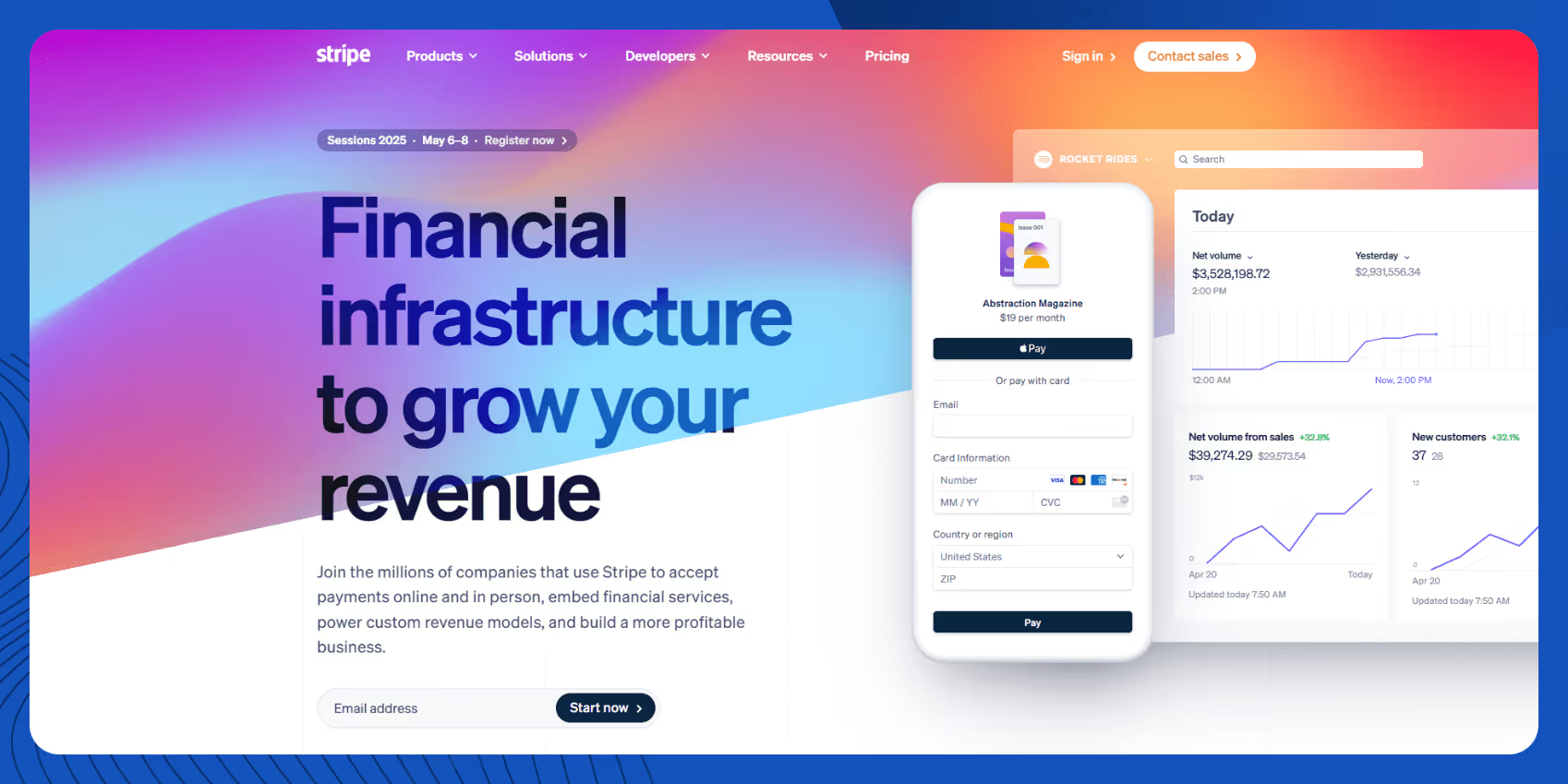.avif)
Chargebee vs. Stripe vs. Orb: Which billing platform is best?
Navigating the world of online billing can be tricky. With so many platforms available, each offering its own set of features and pricing models, it's vital to choose the one that best aligns with your business needs.
In this post, we'll compare three leading billing platforms: Chargebee vs. Stripe vs. Orb.
Read on to learn:
- Key differences between Chargebee, Stripe, and Orb
- Which platform is best suited for SaaS businesses, marketplaces, e-commerce, usage-based billing, and enterprise-level organizations
- How each platform handles recurring billing, subscription management, and complex pricing models
- The pros and cons of each platform to help you make an informed decision
Let’s get started with a quick comparative chart.
Chargebee vs. Stripe vs. Orb: A quick comparison
*Please note: The prices shown for each of these billing platforms were current at the time of publishing. For the latest pricing details, visit their respective websites.
Chargebee

Chargebee is a subscription management and billing platform, tailored for SaaS businesses using a subscription model. It centralizes recurring payments, automated invoicing, and dunning management, facilitating financial operations for subscription-based services.
Features
Chargebee distinguishes itself with features designed for granular subscription control. Beyond basic recurring billing, it offers:
- Advanced proration logic: Chargebee manages complex proration scenarios, confirming accurate billing during mid-cycle plan changes, upgrades, or downgrades.
- Revenue recognition management: Chargebee provides tools to automate revenue recognition in compliance with accounting standards like ASC 606 and IFRS 15.
- Tax management automation: Chargebee automates tax calculations and compliance for global transactions. It integrates with tax services to confirm accurate tax rates are applied based on customer location and product or service type.
- Advanced coupon and discount management: Chargebee allows for the creation of sophisticated coupon and discount structures, including tiered discounts, limited-time offers, and referral programs.
- Multi-currency and multi-language support: Chargebee supports transactions in multiple currencies and languages, helping businesses expand their global reach and cater to international customers. This includes automated currency conversion and localized payment pages.
- Hosted payment pages: Chargebee provides customizable, hosted payment pages that can be integrated into a business's website or application. These pages are designed to boost conversion rates and provide a frictionless checkout experience.
Pricing
Chargebee's pricing model is structured around monthly recurring revenue (MRR) with tiered plans:
- Starter plan: You can start at $0 / per month. It’s a pay-as-you-go model with no annual commitment. Once the business’s cumulative billing exceeds $250k, an overage fee of 0.75% is charged every month for all billing after that.
- Performance plan: This tier costs $599 / per month. This is an annual commitment with discounts available if paid upfront. The same overage fee of 0.75% is charged monthly for all billing that surpasses a $100K monthly limit.
- Enterprise plan: A custom quote is required.
Transaction fees and additional costs
Chargebee does not directly impose transaction fees. However, businesses must account for payment gateway fees, which vary depending on the chosen provider (PayPal, Square, etc.).
Plus, it's important to note that certain advanced features or add-ons might incur extra charges. Therefore, carefully reviewing the pricing structure and understanding all potential costs is essential.
Chargeback and refund policies
Chargebee makes the processing of refunds and the management of chargeback disputes easier, but — as stated before — the underlying policies are dictated by the integrated payment gateway.
When a customer initiates a chargeback, Chargebee provides tools to gather evidence and submit a response to the payment gateway.
Refunds can be issued directly through the Chargebee platform, with the funds being returned to the customer's original payment method. The processing time for refunds and chargebacks depends on the payment gateway's policies and procedures.
Overage and scaling costs
Overage fees are a critical aspect of Chargebee's pricing. For the Starter plan, exceeding $250,000 in cumulative billing results in a 0.75% monthly overage fee. The Performance plan also has MRR limits, with overage fees applied when these limits are surpassed.
Scaling costs should be carefully assessed, as rapid growth can lead to notable overage charges. Businesses should proactively monitor their MRR and consider upgrading to a higher-tier plan to avoid unexpected costs.
Ideal users
Chargebee is most beneficial for SaaS businesses that operate on a subscription model and require advanced subscription management capabilities. Companies that manage tiered pricing, coupons, upgrades, and downgrades will find Chargebee's features particularly useful.
Businesses aiming to improve customer retention through robust dunning management and a complete customer self-service portal are ideal candidates.
Plus, companies seeking to expand their global reach will appreciate Chargebee's support for multiple currencies and languages, along with its extensive integrations with various payment gateways.
Pros and cons
Pros
- Offers a broad range of features for detailed subscription management, including advanced proration logic, revenue recognition management, and tax automation.
- Provides strong API and integration capabilities, allowing for simple integration with existing systems.
- Supports global payment gateways and multi-currency transactions, facilitating international expansion.
- Automates dunning management, improving payment collection and reducing churn.
Cons
- Many Chargebee reviews have reported encountering critical bugs that affect platform reliability.
- Customer support responsiveness has been a point of frustration for some.
- The user interface is often seen as complex and counterintuitive.
- Unexpected fees and unclear billing practices can lead to financial surprises.
Stripe

Stripe is a leading payment processing platform that helps businesses of all sizes accept payments online. It supports a wide array of payment methods, including credit cards, debit cards, digital wallets, and international currencies. Stripe also provides tools for recurring billing, invoicing, and fraud prevention.
Features
Stripe differentiates itself through a combination of features aimed at providing a smooth and customizable payment experience:
- Adaptive acceptance: Stripe dynamically adjusts to different payment methods and currencies, routing transactions through the most efficient channels to improve authorization rates and reduce declines.
- No-code revenue optimization: Stripe offers tools that allow businesses to experiment with different pricing strategies and optimize their revenue without requiring coding. This includes A/B testing different pricing models, offering discounts and promotions, and analyzing revenue data to spot areas for improvement.
- Built-in fraud prevention: Stripe Radar, its fraud prevention system, uses machine learning to pinpoint and block suspicious transactions. It analyzes various signals, including user behavior, location, and payment history, to assess risk and prevent fraudulent activity.
- Unified platform: Stripe provides a single platform for managing all payment-related activities, including payment processing, recurring billing, invoicing, and payouts. Such a centralized approach simplifies financial management and provides a holistic view of a business's financial performance.
- Open-source libraries: Stripe offers a variety of open-source libraries and SDKs, making it easier for developers to integrate Stripe into their applications and build custom payment solutions.
Pricing
Stripe's pricing follows a pay-as-you-go structure. For domestic card transactions, the standard fee is 2.9% + $0.30 per transaction
Transaction fees and additional costs
Transaction fees and extra costs include:
- International payments: Processing payments from international cards typically incurs an extra 1% fee, with an additional 1% for currency conversion if applicable.
- ACH and bank transfers: Direct bank transfers via ACH typically have a fee of 0.8% per transaction, capped at $5.
- Stripe Billing: This service for managing recurring billing and subscriptions has a usage-based fee of 0.7% of the billing volume.
- Stripe Connect: For platforms or marketplaces, Connect offers two pricing models: one where Stripe handles pricing (with a flat fee per transaction plus a percentage of volume) and another where the platform handles pricing (with a fee per active account and a fee per payout).
- Stripe Radar: The basic Radar for Fraud Teams plan is included for free with all Stripe accounts. The advanced version has a per-transaction fee that varies based on the account's pricing plan.
Chargeback and refund policies
Stripe provides tools and resources to help businesses manage chargebacks and process refunds. The platform allows businesses to gather evidence and respond to chargeback disputes directly through the dashboard.
If a chargeback is received, Stripe charges a $15 dispute fee, though this fee may be refunded if the dispute is resolved in the business's favor. Refunds can be issued in full or partially, with processing times varying depending on the payment method and the issuing bank.
Overage and scaling costs
Stripe doesn't have explicit "overage" fees, but scaling costs can arise from increased transaction volume and the use of optional add-ons. As businesses process more transactions, the per-transaction fees accumulate.
Similarly, using services like Stripe Billing, Connect, or Radar will incur additional costs based on usage. Businesses should carefully evaluate their projected transaction volume and feature requirements to anticipate scaling costs.
Ideal users
Stripe is particularly well-suited for e-commerce businesses that need a reliable and easy-to-integrate payment gateway for processing online transactions. Startups and small businesses will appreciate Stripe's transparent pricing and straightforward setup, allowing them to start accepting payments quickly without significant technical hurdles.
Larger companies with dedicated development teams can leverage Stripe's extensive APIs to create highly customized payment solutions and integrate Stripe into their existing systems.
While Stripe offers features for managing recurring subscriptions, it truly shines for businesses with relatively straightforward billing models.
Companies with more complex billing needs, such as usage-based pricing or intricate subscription structures, might find that platforms like Orb offer more specialized tools and flexibility.
Pros and cons
Pros
- Offers a high level of customization through its developer-friendly APIs.
- Provides transparent, pay-as-you-go pricing for basic transactions.
- Scalable infrastructure capable of handling high transaction volumes.
- Offers a unified platform for managing all payment-related activities.
Cons
- For businesses with highly complex billing models, Stripe isn’t an optical choice, especially if they require very specific usage-based or event-driven billing. Stripe has lots of limitations with the former.
- Setting up and customizing the platform can be challenging for those without technical expertise.
- While refunds are free to process, the original transaction fees are typically not refunded.
Orb

Orb is a done-for-you billing platform crafted to provide businesses with total control and accuracy in their billing processes. It's purpose-built for companies that require a flexible and scalable solution to manage complex pricing models, high-volume usage data, and real-time billing, particularly those in the SaaS and AI spaces.
Features
Orb stands out with its unique features designed to address the specific needs of modern businesses with complex billing requirements. Let’s zoom in closer:
- Orb RevGraph: This proprietary technology acts as a central hub for all usage data, ensuring that billing is always accurate and aligned with actual consumption. It provides a single source of truth for all teams, eliminating data discrepancies and simplifying billing operations.
- SQL-powered flexibility: Orb's SQL-based engine allows for highly customizable pricing models. Businesses can define and adjust pricing rules, implement granular discounts, and create unique billing scenarios tailored to their specific needs.
- Real-time usage monitoring: Orb provides real-time visibility into usage data, empowering businesses to track consumption patterns, identify trends, and proactively manage customer engagement. This feature allows for timely interventions and informed decision-making.
- Integrations galore: Orb integrates with various payment gateways, CRMs, and other business tools, creating a unified billing ecosystem. This advantage facilitates operations and guarantees data consistency across different platforms.
- Dedicated AI billing: Orb offers specialized features for AI companies, including support for matrix pricing, token-based billing, and fraud prevention mechanisms tailored to the unique challenges of the AI industry.
Pricing
Orb does not publicly disclose its pricing plans. To get detailed pricing information, businesses need to contact Orb directly for a customized quote based on their specific needs and usage volume.
Transaction fees and additional costs
Orb's pricing model is primarily based on platform usage and does not include additional transaction fees on top of the payment gateway's fees.
Chargeback and refund policies
Orb integrates with leading payment gateways, allowing businesses to leverage the chargeback and refund policies of their chosen provider.
Orb also facilitates the management of these processes by providing tools to track disputes, gather evidence, and process refunds efficiently. The exact policies and procedures for handling chargebacks and refunds are subject to the payment gateway's terms and conditions.
Overage and scaling costs
Orb's pricing structure is designed to scale with business growth, and there are no overage fees for exceeding usage limits within a given plan.
As businesses expand and their usage increases, they can easily upgrade to a higher-tier plan to access extra features and support. This way, scaling costs are predictable and more aligned with business growth.
Ideal Users
Orb is the optimal billing solution for SaaS and AI companies that need a done-for-you platform to manage complex pricing models, high-volume usage data, and real-time billing. It's an excellent fit for businesses that prioritize accuracy, flexibility, and automation in their billing operations.
Companies with dynamic pricing strategies, such as usage-based pricing, tiered subscriptions, or hybrid models, will find Orb's features particularly beneficial.
Plus, Orb's ability to handle granular usage data and recurring billing, and provide real-time insights makes it a valuable asset for businesses seeking to optimize their recurring payments and keep revenue high.
Pros and cons
Pros
- Provides exceptional accuracy and transparency in billing through its unique Orb Rev Graph technology.
- Offers unparalleled flexibility in designing and implementing complex pricing models.
- Enables real-time usage tracking and reporting, empowering data-driven decision-making.
- Integrates with popular payment gateways and business tools.
- Provides specialized features for AI companies, including support for various pricing models.
- Offers dedicated implementation support and ongoing guidance to provide a smooth transition and optimal usage of the platform.
Cons
- Pricing is not publicly disclosed, requiring businesses to contact Orb for a custom quote.
- May not be the most cost-effective solution for businesses with very simple billing needs.
Use-case comparisons: Chargebee vs. Stripe vs. Orb
Let's explore which platform shines in different business scenarios.
Best for SaaS companies: Orb
Orb is specifically designed for B2B SaaS pricing models. It allows for granular usage tracking, flexible pricing adjustments (including tiered pricing and volume discounts), and real-time revenue analytics.
Best for marketplaces and E-commerce: Stripe
Stripe's Connect feature provides a solution for multi-vendor payments, refunds, and payouts. It allows marketplaces to easily onboard sellers, manage their accounts, and facilitate secure transactions. Stripe also offers robust fraud prevention tools and supports a wide range of payment methods, making it a strong choice for e-commerce businesses.
Best for usage-based billing: Orb
Orb's architecture is built from the ground up for usage-based billing. It allows for high-volume data ingestion, flexible pricing configurations, and real-time usage visibility. With Orb, it’s easier for businesses to track usage, implement dynamic pricing, and provide accurate billing,
Best for enterprise-level businesses: Chargebee vs. Stripe
Both Chargebee and Stripe offer enterprise-level plans with good scalability and support for large organizations. The best choice depends on specific needs.
Chargebee's strength lies in its complete subscription management features and global payment capabilities. Stripe, on the other hand, offers greater customization through its APIs and a wider range of integrations.
Orb, while newer, is also gaining traction with enterprise businesses due to its focus on usage-based billing and insights backed by cold hard data.
Which should you choose?
In the Chargebee vs. Stripe vs. Orb comparison, the optimal choice hinges on your specific business needs. So let’s do a quick last comparison:
- Orb is the clear leader for businesses with complex billing requirements, particularly those focused on usage-based pricing and SaaS models. It offers unparalleled accuracy, flexibility, and real-time insights, specifically catering to the needs of SaaS and AI companies.
- Chargebee is a strong option for businesses needing solid subscription management features and global payment capabilities. It’s good at handling recurring subscriptions, coupons, and customer retention.
- Stripe is a versatile payment gateway that's easy to use and offers extensive integrations. It's a good fit for businesses with straightforward payment needs or those requiring deep customization through APIs.
Discover Orb: Flexible billing made easy
In the Chargebee vs. Stripe vs. Orb landscape, Orb stands out as the billing platform built for speed and scale. Unlike other platforms that lock you into rigid systems, Orb helps you:
- Adapt with agility: Experiment with pricing, iterate on strategies, and respond to market changes without limitations. Launch new pricing models without engineering, test pricing changes using historical data, and use Orb's SQL-based tools for maximum flexibility.
- Bill with precision: Deliver accurate, error-free billing and invoices with Orb's RevGraph. This huge differentiator provides second-to-none data accuracy and reporting, a complete audit trail, and real-time usage tracking for complete confidence in your billing.
- Scale confidently: Orb's extensible architecture grows with your needs. Use high-scale data ingestion, no-frills financial stack integration, and built-in revenue analytics for a future-proof billing solution.
- Benefit from true partnership: Orb acts as a trusted guide, offering dedicated implementation support, industry expertise, and ongoing improvements to help you on your road to success with usage-based pricing.
Ready to unlock your growth potential? Explore our pricing options and discover how we can help you achieve your goals.
Ready to solve billing?





